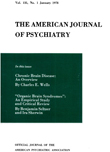Chronic Marijuana Use and Psychosocial Adaptation
Abstract
The authors studied the life history and adaptation of marijuana users and nonusers in a randomly selected representative sample of ten percent of the UCLA undergraduate student body. Statistically significant differences were discovered in family and personal history; educational and work performance; legal history; marital and sexual adjustment; current adaptation; political, religious, and other values; and the use of other drugs. Chronic use of marijuana was not accompanied by significant deterioration in functioning or adaptation but was accompanied by increasing acculturation into a relativistic, gratification-oriented, stimulus-seeking value system.
Access content
To read the fulltext, please use one of the options below to sign in or purchase access.- Personal login
- Institutional Login
- Sign in via OpenAthens
- Register for access
-
Please login/register if you wish to pair your device and check access availability.
Not a subscriber?
PsychiatryOnline subscription options offer access to the DSM-5 library, books, journals, CME, and patient resources. This all-in-one virtual library provides psychiatrists and mental health professionals with key resources for diagnosis, treatment, research, and professional development.
Need more help? PsychiatryOnline Customer Service may be reached by emailing [email protected] or by calling 800-368-5777 (in the U.S.) or 703-907-7322 (outside the U.S.).



